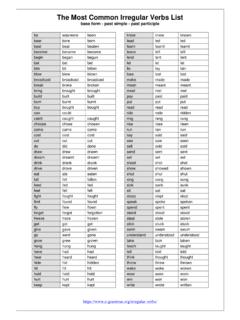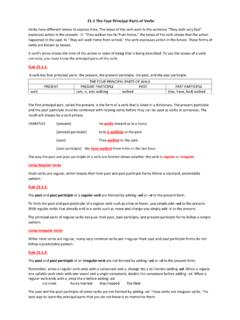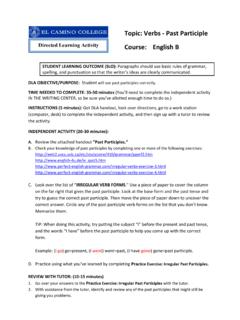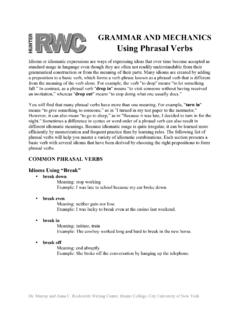Transcription of The Preterite Tense
1 Unit 1 Tense : PreleriteTIME: Rt^fers to spe cific, compleled pastactionsKEY PHRASES: Certamlime (last night, yes terday at 1:00, lastJuly 4th); certainnumber of timesSTRICTI RE: Simpletense: verb base +endingThe Preterite TenseThe Preterite Tense allows you to refer to specific past actions per formed (1) at a fixed point in time, (2) a specific number oftimes, or (3) during an enclosed amount of key is the quantitative nature of the action. If the action is inthe past and you can pin-point it as to when or how many times itoccurred, you will use the Preterite Tense . It is as though therewere a frame or box around the action. Consider the followingsentences:Fixed point in time:I called you at 3 bought the car on Tuesday saw the movie last number of actions:I called you five ate ten read the book amount of time:I zvorked for eight movie lasted two and a half lived there for trvo each of the preceding sentences, the action's time is specific,measured in some way, either by the clock, the calendar, or num ber of times the action is important to remember that while an obvious feature of thepreterite Tense is how it quantifies action, we do not always statethe quantity of our actions.
2 When the quantity is not stated, it isgenerally implied. Consider these sentences:1. I ri'cw;'to John's We a/^ at McDonald' The meeting juas \\i84 Spanish verb TensesIn the first two sentences, the implication is that the person performed the action once. In thethird, the implication is that the enUre meeting, from beginning to end, was good test for determining if a sentence is in the Preterite is to consider if it is reasonable toask "For how long?" or "When?" the action took example, if someone tells you, 'John called me," you can reasonably ask, "WTien?" andexpect a specific answer. But if this person says, 'John used to call me several dmes a day," youprobably would be wasting your time if you asked other words, 'John called me" is in the Preterite , while 'John used to call me several times aday" is not (this latter sentence is in the imperfect Tense , which will be discussed in the next unit).
3 Regular Verbs in the PreteriteTo form regular verbs in the Preterite you do the following:-ar verbs: drop the -ar and add the following endings:-e -amos-aste -asteis-6 -aron(/ spoke, you spoke, etc.)yo hable nosotros hablamostu hablaste vosotros hablasteisel hablo ellos hablaronNote that the nosotros form is identical in the Preterite and the present tenses for :Yo miraste la watched the me llamo tres called me three con spoke with comprasteis bought contaron el counted the and -ir verbs: drop the -er or -ir and add the following endings:1-itnosiste-isteisio-ieron(I ate, you ate, etc.)yo comi nosotros comimostii comiste vosotros comisteisel comio ellos comieron(/ opened, you opened, etc.)yo abri nosotros abrimostii abriste vosotros abristeisel abrio ellos abrieronNote: Most stem-changing verbs change only in the present Tense (not in the Preterite ), ,contar (to count): yo cuento (I count); 310 (I counted).
4 The exceptions to this are -ir stem-changing verbs, and are discussed under irregular verbs, on page :Escribi una zvrote a letterComimos ate Preterite Tense 85 Vendiste tii casa. Rompisteis las sold vour house. Von broke the bebio tres vasos de leche. Ellos abrieron las c/rrtnA'three glasses of milk. They /J^w /the working with the Preterite , it is important to be familiar with the more common Preterite "markers," or words and phrases that indicate specific time frames. Several are listed yesterday la semana pasada last weekanoche last night el mes (ano) pasado last month (year)esta mafiana this morning hace_____ _____agoesta tarde this afternoon ayer por la manana/tarde yesterday morning/afternoonPara ti, ^cual es verdadcro o fal $o?_____'_ 1. Hable por telefono ayer por la 2.
5 Comi una ensalada 3. Abri las ventanas en mi casa hace dos 4. Mire la television 5. Bebi jugo de naranja esta 6. AsistI a la escnela la semana pasada. ' 7. Compre un coche el aho 8. Vendi mi casa el mes I bought a shirt Y<jLi studied last She worked for two hours. ____4. We washed tlie dishes. _____5. They sang five songs. _____6. I ran to the corner. _____7. Yon wrote a letter. _____8. She opened the door. _____9. We didn't open those Spanish verb Tenses10. They sold the We danced the tango last They spoke with the owner. ____13. I took a shower this You washed your hair. _____15. They went to bed at eleven-thirty.;Te toea a ti!Responde, am frases complelas, a las siguientes pregunUis:1. ;Hablaste por telefono anoche? _____2. ^;D6nde te compraste la camisa?
6 _____3. iQue comiste anoche? _____4. ;Que recibiste para tu liltimo cumpleaiios?5. ^[Escuchaste la radio hoy? _____6. (jTomaste cafe ayer por la mahana?7. ^Bailaste el fin de semana pasado?8. ^Estudiaste espahol el aho pasado?Orthographic Changes in Regular VerbsThere are three standard orthographic (spelling) changes in Spanish which affect verbs in thepreterite as well as in other tenses. In the Preterite , these changes occur only in the first personsingular yo form. They are as follows:1. verbs ending in -gar: insert a u before the e: yo Uegue (1 arrived)2. verbs ending in -car: the c changes to qu before the letter e: yo practique (1 practiced)3. verbs ending in -zar: the z changes to c before the letter e: yo empece (1 began)The reason for the first two changes is phonetic: in order to retain the original hard g and csounds, the letter u is inserted (the letters g and c are soft before the vowels e and i).)]
7 In the lastchange it is because the letter z n(wer directly precedes the leUer e in Spanish (except in rarecases when ze are the first two letters of a word).Some frequently used \ erbs in these categories, with the Preterite yo form:Uegar to arrive yo Ueguejugar to play (a game) jojugueThe Preterite Tense87pagarto pay (for)yo pagueregarto water (a plant)yo reguesegarto mow (grass, etc.)yoseguetragarto swallowyo traguevagarto wanderyo vagueaparcarto parkyo aparquebuscarto look for, searchyo husqueclarificarto clarifyyo clarifiqueclasificarto classifyyo dasifiquedestacarto stand outyo destaqueempacarto packyo empaquejustificarto justifyyojustifiquepracticarto practiceyo practiquesacarto take out, take a pictureyosaquetocarto touch, play (an instrument)yo toqueautorizarto authorizeyo autoricecomenzarto commence, beginyo cotnenceempezarto beginyo empeceorganizarto organizeyo orgamcerezarto prayyo recesimbolizarto symbolizeyo simbolicetrazarto traceyo tracetropezarse (con)to bump (into)yo me tropeceRemember.)
8 Only verbs in the jioform are affected by these orthographic I pracdced the piano for an I arrived at two o' I organized the I began to dance on the I played the guitar for two hours at the I played tennis with the pro {el jugadorprofesiirnal).7. I took twenty pictures of my I authorized the purchase. _____9. I classified the information. ___88 Spanish verb Tenses10. I bumped into your hotise's step (elpeldano).11. 1 parked the car in a prohibited space. _____12. I never stood out in English for ni)- I swallowed the medicine without I paid the gas I watered my friend Lola's note: WTiile these three types of verbs do not exactly follow the regular pattern of formingthe Preterite Tense , they are still considered regular verbs in the Preterite because these changesoccur at all times in all Verbs in the PreteriteThere are several irregular verbs in the Preterite .}
9 While patterns do emerge and the endingsare similar, it is important to understand the various types of following eleven verbs all take this set of endings:-e-imos-iste-isteis-o-ieron1. andar to walk2. estar to be3. tener to have4. caber to fit5. haber auxiliary, to have6. poder to be able to7. poner to put, place8. saber to know9. hacer to make, do10. querer to want11. venir to comeanduv-estuv-tuv-cup-hub-pud-pus-sup- hic-quis-vin-anduve; anduviste; anduvo ..estuve; estuviste; estuvo ..tuve; tuviste; tuvo ..cupe; cupiste; cupo ..hube; hubiste; bubo ..pude; pudiste; pudo ..puse; pusiste; puso ..supe; supiste; supo ..bice; hiciste; hizo ..quise; quisiste; quiso ..vine: viniste: vino ..Note:1. Verbs 1-3 take the letter uv in the new stem; 4-8 take a ;/, and 9-11 take an /.2. The only exception above is the third person singular of Jiaa'r, which is hizo.
10 (The r changesto z to avoid the k sound.)3. There are no accent marks on these irregular For their full conjugations, consult the Preterite verb chart in the Preterite Tense89 Para ti, ^cual es verdadero o falso?_____ 1. Tuve una fiesta hace dos 2. Anduve a la escuela esta 3. Anoche no pude 4. No hice nada 5. Alguien vino a mi casa el fin de semana 6. Fuse los zapatos en el armario 7. Estuve increiblemente enfermo/a 8. Anduve al cine esta I walked to the He came to my Last night I couldn't They had an accident last We made the beds this morning. _6. When did you know (find out) the answer?7. Yoti {pi fam.) were here for no more than ten I put the clothes in the What did you do last night?10. They had to work for ten hcjurs I put on my shoes.}







